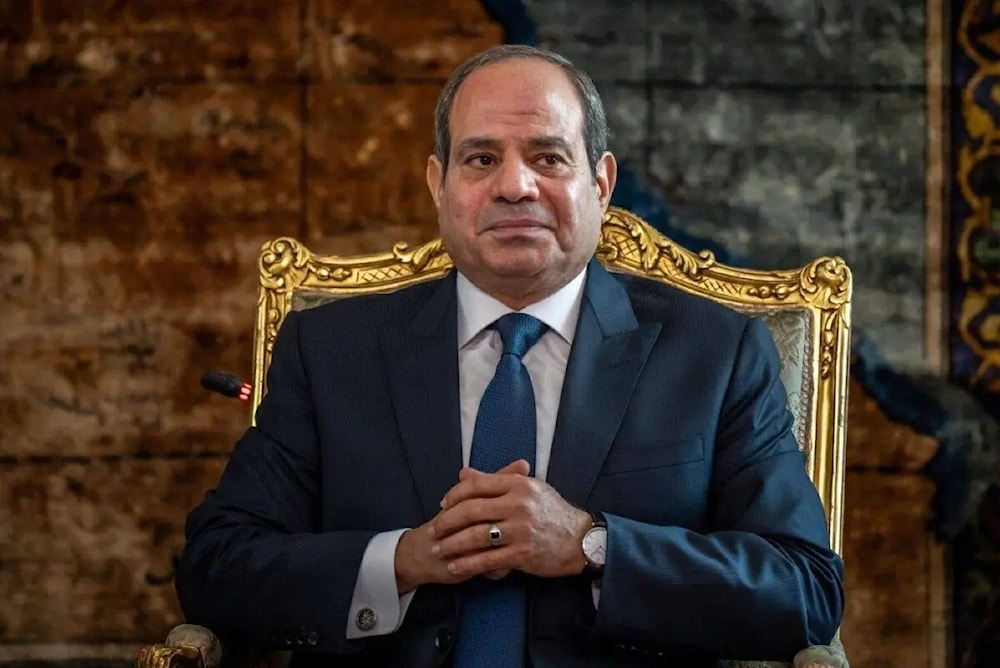El-Sisi turns down Netanyahu call amid tensions over Philadelphi axis
This rejection comes in the midst of serious disagreements with regards to potential courses of action along the Philadelphi axis in Rafah.
-

Egypt’s President Abdel Fattah El-Sisi in Cario on October 18, 2023. (AFP)
Israeli news broadcaster Channel 13 reported on Wednesday that Egyptian President Abdel Fattah el-Sisi refused to coordinate a phone call with Israeli Prime Minister Benjamin Netanyahu.
According to the broadcaster, the Israeli National Security Council, upon Netanyahu's request, attempted to coordinate a phone call with El-Sisi, but the latter did not respond.
A representative from Netanyahu's office confirmed these details, but no further comments were provided.
The broadcaster said that this rejection comes amid serious disagreements about potential courses of action along the Philadelphi axis in Rafah.
The last time Netanyahu and El-Sisi had a conversation was in June 2023, following an attack on the Egyptian border, just months before the war's outbreak.
Read more: Egypt rejects Israeli proposal for increased oversight on borders
The "Philadelphi Axis" is a region that extends from the Israeli-controlled Karam Abu Salem crossing, linking the Gaza Strip and occupied territories, to the southernmost point on the Gaza Strip's coast.
Also known as the "Philadelphi Route", the 14 km narrow strip of land separated Palestine from Egypt and was established as a buffer zone between "Israel" and Egypt in a 1979 treaty. Before the Strip was liberated in 2005, the Axis was under the control of Israeli occupation forces.
Currently, the Israeli political command is attempting to occupy the axis and deploy forces in the area. Netanyahu called for another axis of invasion to be opened up in the Gaza Strip, seeking to bolster the occupation's geographical control of the region.
Essentially, Israeli authorities seek to completely isolate the Gaza Strip from the rest of the world, by deploying forces in the only terrain linking the Palestinian territory to another country. Adding to a strict siege that has cut off all goods from the Gaza Strip since October 7, excluding a measly amount of aid entering through the Rafah border crossing, the occupation's top officials want to cut off any supplies from entering the Strip.
Earlier this month, news sources revealed that Egypt turned down a proposal from "Israel seeking greater oversight over the buffer zone on the border with Gaza. Three Egyptian security sources disclosed that Egypt is prioritizing efforts to broker a ceasefire before delving into post-war arrangements.
An Egyptian official later denied any cooperation between Egypt and the Israeli occupation concerning the axis, confirming to reporters that media reports discussing such cooperation are unfounded.
Israeli control over 'Philadelphi Axis' threatens relations
On Monday, the head of the Egyptian Information Service Diaa Rashwan confirmed that Israeli attempts to control the Philadelphi axis poses a grave threat to Egyptian-Israeli relations.
In a statement on the State Information Service (SIS) website, Rashwan said that "the recent period has seen numerous statements from Israeli officials, particularly Prime Minister Benjamin Netanyahu, making claims and false accusations regarding the alleged smuggling operations of weapons, explosives, ammunition, and other components into the Gaza Strip from Egyptian territory.
He further emphasized the Israeli persistence in promoting these falsehoods is an effort to justify its intent to seize control of the "Philadelphi Axis" or the Salah al-Din Corridor within the Gaza Strip along the border with Egypt. "This action constitutes a breach of the security agreements and protocols previously signed between him and Egypt."
Rashwan stressed that "It must be strictly emphasized that any Israeli move in this direction will seriously threaten Egyptian-Israeli relations."
Read more: 'Too late; mission accomplished': Hamas says 'Israel' tunnel find vain

 4 Min Read
4 Min Read








